2025年中考英语二轮复习课件 专题28 省略句(共30张PPT)
文档属性
| 名称 | 2025年中考英语二轮复习课件 专题28 省略句(共30张PPT) | 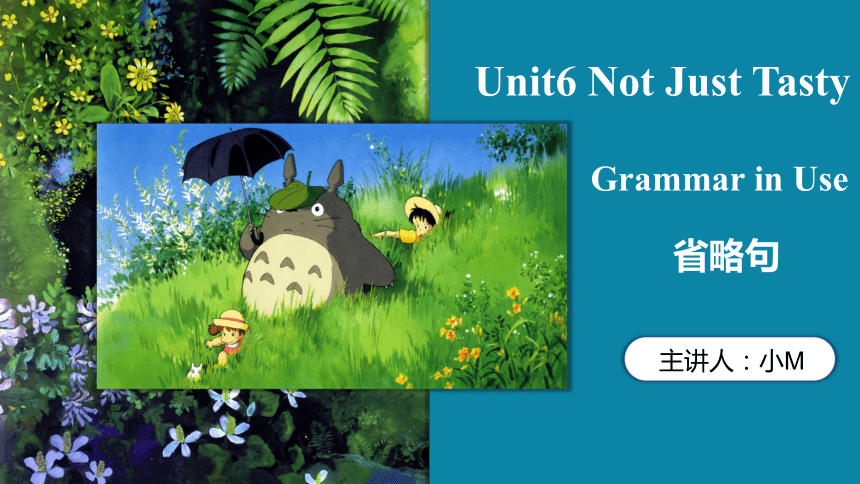 | |
| 格式 | pptx | ||
| 文件大小 | 44.0MB | ||
| 资源类型 | 教案 | ||
| 版本资源 | 通用版 | ||
| 科目 | 英语 | ||
| 更新时间 | 2025-06-26 07:31:18 | ||
图片预览

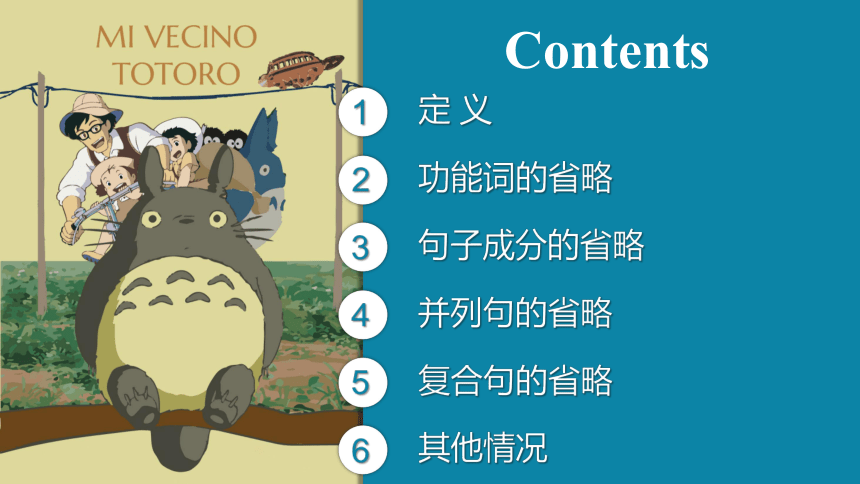
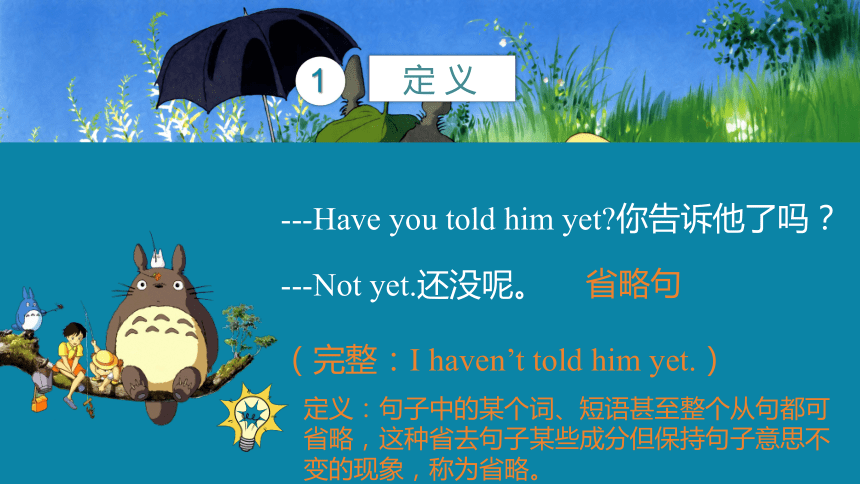
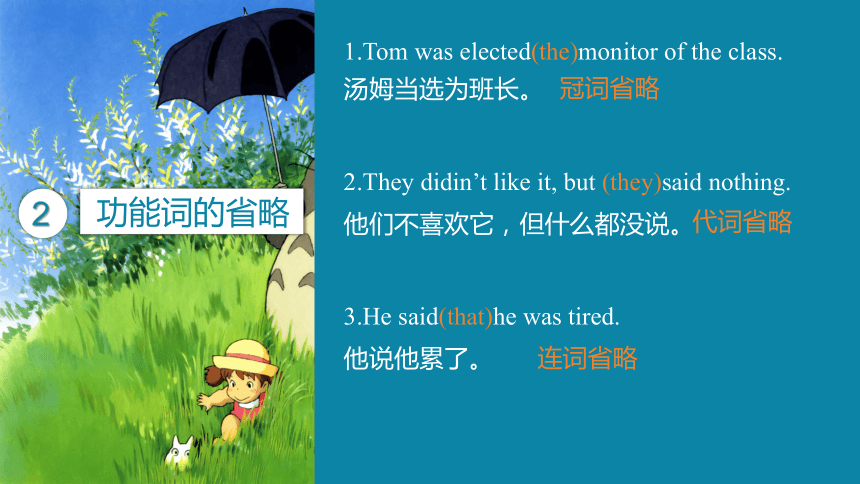
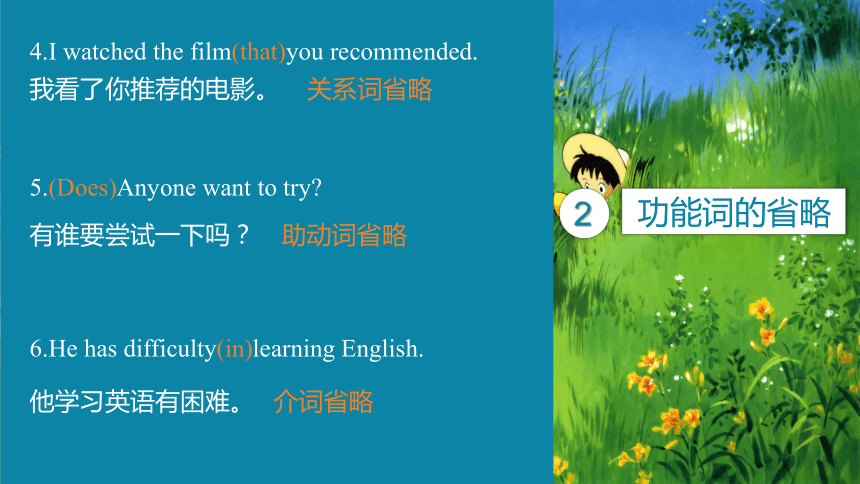
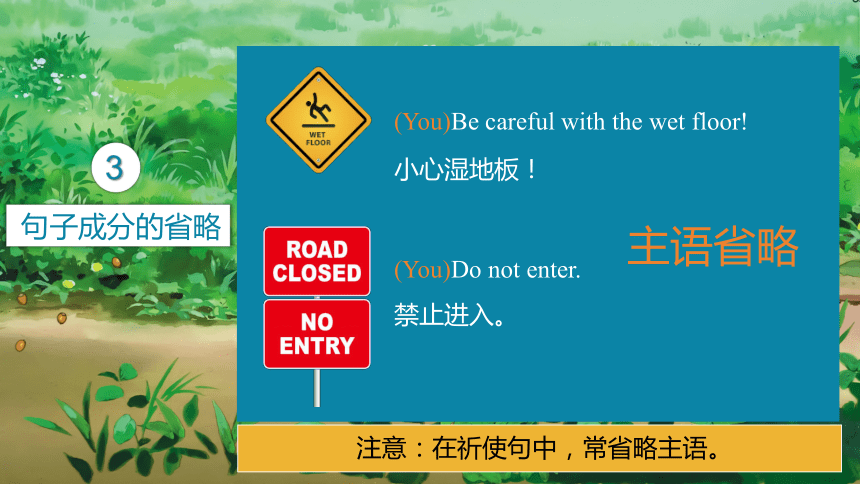
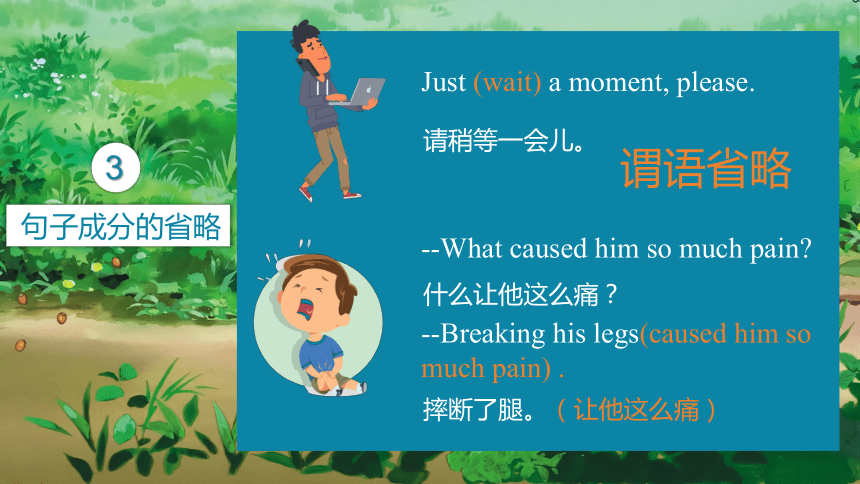
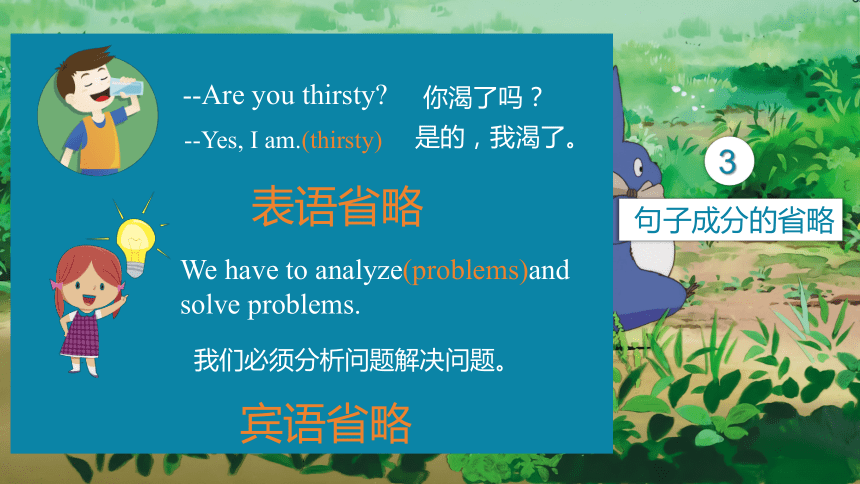
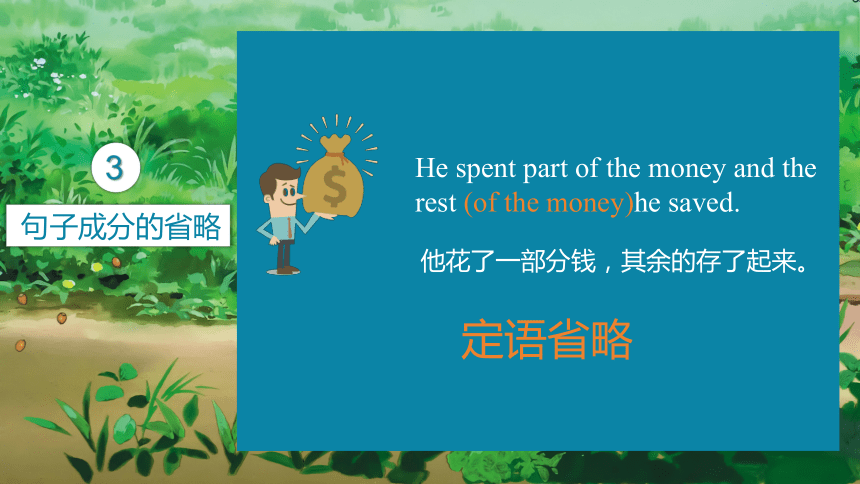
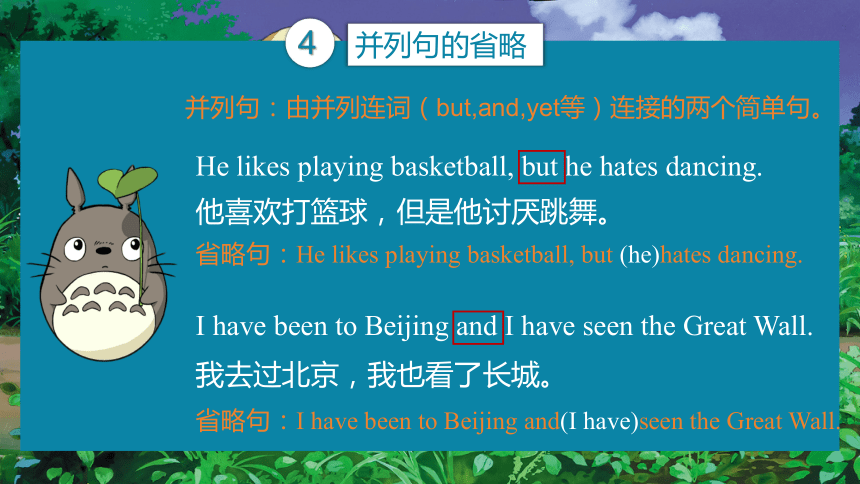


文档简介
(共30张PPT)
Unit6 Not Just Tasty
Grammar in Use
省略句
主讲人:小M
Contents
1
定 义
2
功能词的省略
3
句子成分的省略
4
并列句的省略
5
复合句的省略
6
其他情况
1
定 义
---Have you told him yet 你告诉他了吗?
---Not yet.还没呢。
省略句
(完整:I haven’t told him yet.)
定义:句子中的某个词、短语甚至整个从句都可省略,这种省去句子某些成分但保持句子意思不变的现象,称为省略。
2
功能词的省略
1.Tom was elected(the)monitor of the class.
汤姆当选为班长。
冠词省略
2.They didin’t like it, but (they)said nothing.
他们不喜欢它,但什么都没说。
代词省略
3.He said(that)he was tired.
他说他累了。
连词省略
2
功能词的省略
4.I watched the film(that)you recommended.
我看了你推荐的电影。
关系词省略
2.They didin’t like it, but (they)said nothing.
他们不喜欢它,但什么都没说。
代词省略
5.(Does)Anyone want to try
有谁要尝试一下吗?
助动词省略
6.He has difficulty(in)learning English.
他学习英语有困难。
介词省略
3
句子成分的省略
(You)Be careful with the wet floor!
小心湿地板!
(You)Do not enter.
禁止进入。
主语省略
注意:在祈使句中,常省略主语。
3
句子成分的省略
Just (wait) a moment, please.
请稍等一会儿。
--What caused him so much pain
什么让他这么痛?
--Breaking his legs(caused him so much pain) .
摔断了腿。(让他这么痛)
谓语省略
3
句子成分的省略
--Are you thirsty
--Yes, I am.(thirsty)
你渴了吗?
是的,我渴了。
表语省略
We have to analyze(problems)and solve problems.
我们必须分析问题解决问题。
宾语省略
3
句子成分的省略
He spent part of the money and the rest (of the money)he saved.
他花了一部分钱,其余的存了起来。
定语省略
4
并列句的省略
He likes playing basketball, but he hates dancing.
I have been to Beijing and I have seen the Great Wall.
他喜欢打篮球,但是他讨厌跳舞。
我去过北京,我也看了长城。
并列句:由并列连词(but,and,yet等)连接的两个简单句。
省略句:He likes playing basketball, but (he)hates dancing.
省略句:I have been to Beijing and(I have)seen the Great Wall.
4
并列句的省略
省略句:He likes playing basketball, but (he)hates dancing.
省略句:I have been to Beijing and(I have)seen the Great Wall.
定义:在并列句中,如果前后句有相同的成分,常可以省略,被省略的可以是主语,谓语,宾语等,或句子成分的一部分。
4
并列句的省略
Some books are to be tasted, others(are)to be swallowed, and some few(are)to be chewed and digested.
有些书是应当尝尝滋味的,有些书是应该吞食下去的,有少数书是应当咀嚼和消化的。
谓语省略
4
并列句的省略
I asked him to see the film, but he didn’t want to
(see the film).
我请他去看电影,但他不想去。
省略了作宾语的不定式。
为了避免重复,不定式可以省去与前面句子重复的动词原形,但是to要保留。
4
并列句的省略
为了避免重复,不定式可以省去与前面句子重复的动词原形,但是to要保留。
--Will you come to my party
--I’d love to(come to the party).
4
并列句的省略
若被省略的不定式为to be短语,则通常要保留to be.
--Will you come to my party
--I’d love to(come to the party).
He is no longer the man he used to be(the man).
他不再是以前那个他了。
4
并列句的省略
We can(win tomorrow’s game), and will win tomorrow’s game.
我们能够,而且将会赢得明天的比赛。
省略了谓语+宾语
5
复合句的省略
(I’m)Sorry I can’t do it.
抱歉,我做不了这件事。
If he says he’ll come, he will(come).
如果他说会来,他就一定会来。
复合句也叫主从句,指含有两个或更多的
主谓结构的句子,通常有连接词连接。
5.1复合句的省略:状语从句
When(she was)very young, she began to play the piano.
当她还很小的时候,就开始弹钢琴了。
If(you are)asked, you may come in.
如果被问到,你就可以进来了。
在状语从句中,如果主从句的主语一致,从句可省掉“主语+be”部分
5.2 as if, though,if 引导的方式状语从句
The dog lay there, as if (it was) dead.
这只狗躺在那里,好像死了。
Though(she is)young, she knows a lot.
虽然很年轻,但是她懂很多。
5.3 比较句的省略
Smith enjoys reading more than Jane(likes reading).
史密斯比简更喜欢阅读。
在比较句中,从句经常省略和主句重复的成分。
省略了所有谓语部分
5.3 比较句的省略
Smith enjoys reading more than Jane(likes reading).
史密斯比简更喜欢阅读。
在比较句中,从句经常省略和主句重复的成分。
He speaks French as fluently as(he speaks)English.
他说法语跟英语一样流利。
省略了主语+谓语
5.3 比较句的省略
He speaks French as fluently as(he speaks)English.
他说法语跟英语一样流利。
省略了所有主语+谓语
You have more money than I expected(that you have).
我比我预料的更有钱。
省略了宾语
其他情况:do可以代替动词或动词加其他部分
6
He plays badminton better than I do.
他打羽毛球比我打得好。
I do=I play badminton
so在expect,think,hope,believe后面代替词组,句子等
6
--He will study hard.
--I hope so.
so=that he will study hard
他会努力学习的。
我希望如此。
not代替否定的句子
6
Would you come to my party next Saturday
I’m afraid not.
你下周六能来参加我的派对吗?
我恐怕来不了。
I’m afraid not= I’m
afraid that I can’t come.
日常交际的省略
6
--How many copies do you want
--(I want)Three(copies).
你要几份复印件?
三份。
日常交际的省略
6
Too bad.太糟糕了。
Where to go 要去哪?
Not yet!还没呢
Me too.我也一样
Up to you.你说了算
Practice Time
1.---Will you waste your time and money on that
---Of course_______.
A.I not. B.don’t C.not D.did
2.Tom wanted to play football with his friends on the streets, but his father told him_________.
A.not to B.not to do C.not do it D.do not to
3.---Can I see you at 3:00 pm next Monday
---I_________.My flight will take off soon.
A.am afraid not B.am afraid so C.am afraid to D.am afraid not to
4.---Are you a volunteer
---No, but I______.
A.used to B.used to be C.used to do D.was used to
C
A
A
B
Practice Time
5.---I hope the children won’t touch the dog.
---I’ve warned them______.
A.not B.not to C.not touch D.not do
6.Some students are going to America this summer vacation, and_________.
A.some are to China B.some going to China
C.some to China D.some America
7.---Aren’t you the manager
---No, and I_______.
A.don’t want B.don’t want to C.don’t D.don’t want to be
8.---You look happy today, Mary.
---I like my nre dress and my mother_____,too.
A.likes B.like C.is D.do
B
C
D
D
Practice Time
Write the complete form of the following sentences according to the context in this unit.
(1) Sounds great.
_______________________________________________________________
(2) Um… for me, the cream of mushroom soup.
_______________________________________________________________
(3) Roast beef, please.
_______________________________________________________________
(4) Yes, indeed.
_______________________________________________________________
(5) Just a glass of orange juice.
_______________________________________________________________
It sounds great.
Um...for me, I’d like the cream of mushroom soup to start with.
I’d like roast beef as the main course, please.
Yes, the specialties there are indeed tasty.
I just like a glass of orange juice to drink.
Unit6 Not Just Tasty
Grammar in Use
省略句
主讲人:小M
Contents
1
定 义
2
功能词的省略
3
句子成分的省略
4
并列句的省略
5
复合句的省略
6
其他情况
1
定 义
---Have you told him yet 你告诉他了吗?
---Not yet.还没呢。
省略句
(完整:I haven’t told him yet.)
定义:句子中的某个词、短语甚至整个从句都可省略,这种省去句子某些成分但保持句子意思不变的现象,称为省略。
2
功能词的省略
1.Tom was elected(the)monitor of the class.
汤姆当选为班长。
冠词省略
2.They didin’t like it, but (they)said nothing.
他们不喜欢它,但什么都没说。
代词省略
3.He said(that)he was tired.
他说他累了。
连词省略
2
功能词的省略
4.I watched the film(that)you recommended.
我看了你推荐的电影。
关系词省略
2.They didin’t like it, but (they)said nothing.
他们不喜欢它,但什么都没说。
代词省略
5.(Does)Anyone want to try
有谁要尝试一下吗?
助动词省略
6.He has difficulty(in)learning English.
他学习英语有困难。
介词省略
3
句子成分的省略
(You)Be careful with the wet floor!
小心湿地板!
(You)Do not enter.
禁止进入。
主语省略
注意:在祈使句中,常省略主语。
3
句子成分的省略
Just (wait) a moment, please.
请稍等一会儿。
--What caused him so much pain
什么让他这么痛?
--Breaking his legs(caused him so much pain) .
摔断了腿。(让他这么痛)
谓语省略
3
句子成分的省略
--Are you thirsty
--Yes, I am.(thirsty)
你渴了吗?
是的,我渴了。
表语省略
We have to analyze(problems)and solve problems.
我们必须分析问题解决问题。
宾语省略
3
句子成分的省略
He spent part of the money and the rest (of the money)he saved.
他花了一部分钱,其余的存了起来。
定语省略
4
并列句的省略
He likes playing basketball, but he hates dancing.
I have been to Beijing and I have seen the Great Wall.
他喜欢打篮球,但是他讨厌跳舞。
我去过北京,我也看了长城。
并列句:由并列连词(but,and,yet等)连接的两个简单句。
省略句:He likes playing basketball, but (he)hates dancing.
省略句:I have been to Beijing and(I have)seen the Great Wall.
4
并列句的省略
省略句:He likes playing basketball, but (he)hates dancing.
省略句:I have been to Beijing and(I have)seen the Great Wall.
定义:在并列句中,如果前后句有相同的成分,常可以省略,被省略的可以是主语,谓语,宾语等,或句子成分的一部分。
4
并列句的省略
Some books are to be tasted, others(are)to be swallowed, and some few(are)to be chewed and digested.
有些书是应当尝尝滋味的,有些书是应该吞食下去的,有少数书是应当咀嚼和消化的。
谓语省略
4
并列句的省略
I asked him to see the film, but he didn’t want to
(see the film).
我请他去看电影,但他不想去。
省略了作宾语的不定式。
为了避免重复,不定式可以省去与前面句子重复的动词原形,但是to要保留。
4
并列句的省略
为了避免重复,不定式可以省去与前面句子重复的动词原形,但是to要保留。
--Will you come to my party
--I’d love to(come to the party).
4
并列句的省略
若被省略的不定式为to be短语,则通常要保留to be.
--Will you come to my party
--I’d love to(come to the party).
He is no longer the man he used to be(the man).
他不再是以前那个他了。
4
并列句的省略
We can(win tomorrow’s game), and will win tomorrow’s game.
我们能够,而且将会赢得明天的比赛。
省略了谓语+宾语
5
复合句的省略
(I’m)Sorry I can’t do it.
抱歉,我做不了这件事。
If he says he’ll come, he will(come).
如果他说会来,他就一定会来。
复合句也叫主从句,指含有两个或更多的
主谓结构的句子,通常有连接词连接。
5.1复合句的省略:状语从句
When(she was)very young, she began to play the piano.
当她还很小的时候,就开始弹钢琴了。
If(you are)asked, you may come in.
如果被问到,你就可以进来了。
在状语从句中,如果主从句的主语一致,从句可省掉“主语+be”部分
5.2 as if, though,if 引导的方式状语从句
The dog lay there, as if (it was) dead.
这只狗躺在那里,好像死了。
Though(she is)young, she knows a lot.
虽然很年轻,但是她懂很多。
5.3 比较句的省略
Smith enjoys reading more than Jane(likes reading).
史密斯比简更喜欢阅读。
在比较句中,从句经常省略和主句重复的成分。
省略了所有谓语部分
5.3 比较句的省略
Smith enjoys reading more than Jane(likes reading).
史密斯比简更喜欢阅读。
在比较句中,从句经常省略和主句重复的成分。
He speaks French as fluently as(he speaks)English.
他说法语跟英语一样流利。
省略了主语+谓语
5.3 比较句的省略
He speaks French as fluently as(he speaks)English.
他说法语跟英语一样流利。
省略了所有主语+谓语
You have more money than I expected(that you have).
我比我预料的更有钱。
省略了宾语
其他情况:do可以代替动词或动词加其他部分
6
He plays badminton better than I do.
他打羽毛球比我打得好。
I do=I play badminton
so在expect,think,hope,believe后面代替词组,句子等
6
--He will study hard.
--I hope so.
so=that he will study hard
他会努力学习的。
我希望如此。
not代替否定的句子
6
Would you come to my party next Saturday
I’m afraid not.
你下周六能来参加我的派对吗?
我恐怕来不了。
I’m afraid not= I’m
afraid that I can’t come.
日常交际的省略
6
--How many copies do you want
--(I want)Three(copies).
你要几份复印件?
三份。
日常交际的省略
6
Too bad.太糟糕了。
Where to go 要去哪?
Not yet!还没呢
Me too.我也一样
Up to you.你说了算
Practice Time
1.---Will you waste your time and money on that
---Of course_______.
A.I not. B.don’t C.not D.did
2.Tom wanted to play football with his friends on the streets, but his father told him_________.
A.not to B.not to do C.not do it D.do not to
3.---Can I see you at 3:00 pm next Monday
---I_________.My flight will take off soon.
A.am afraid not B.am afraid so C.am afraid to D.am afraid not to
4.---Are you a volunteer
---No, but I______.
A.used to B.used to be C.used to do D.was used to
C
A
A
B
Practice Time
5.---I hope the children won’t touch the dog.
---I’ve warned them______.
A.not B.not to C.not touch D.not do
6.Some students are going to America this summer vacation, and_________.
A.some are to China B.some going to China
C.some to China D.some America
7.---Aren’t you the manager
---No, and I_______.
A.don’t want B.don’t want to C.don’t D.don’t want to be
8.---You look happy today, Mary.
---I like my nre dress and my mother_____,too.
A.likes B.like C.is D.do
B
C
D
D
Practice Time
Write the complete form of the following sentences according to the context in this unit.
(1) Sounds great.
_______________________________________________________________
(2) Um… for me, the cream of mushroom soup.
_______________________________________________________________
(3) Roast beef, please.
_______________________________________________________________
(4) Yes, indeed.
_______________________________________________________________
(5) Just a glass of orange juice.
_______________________________________________________________
It sounds great.
Um...for me, I’d like the cream of mushroom soup to start with.
I’d like roast beef as the main course, please.
Yes, the specialties there are indeed tasty.
I just like a glass of orange juice to drink.
同课章节目录
- 词法
- 名词
- 动词和动词短语
- 动词语态
- 动词时态
- 助动词和情态动词
- 非谓语动词
- 冠词
- 代词
- 数词和量词
- 形容词副词及其比较等级
- 介词和介词短语
- 连词和感叹词
- 构词法
- 相似、相近词比较
- 句法
- 陈述句
- 一般疑问句和否定疑问句
- 特殊疑问句及选择疑问句
- 反意疑问句
- 存在句(There be句型)
- 宾语从句
- 定语从句
- 状语从句
- 主谓一致问题
- 简单句
- 并列句
- 复合句
- 主谓一致
- 主、表语从句
- 名词性从句
- 直接引语和间接引语
- 虚拟语气
- 感叹句
- 强调句
- 倒装句
- 祈使句
- 句子的成分
- 句子的分类
- 题型专区
- 单项选择部分
- 易错题
- 完形填空
- 阅读理解
- 词汇练习
- 听说训练
- 句型转换
- 补全对话
- 短文改错
- 翻译
- 书面表达
- 任务型阅读
- 语法填空
- 其他资料
